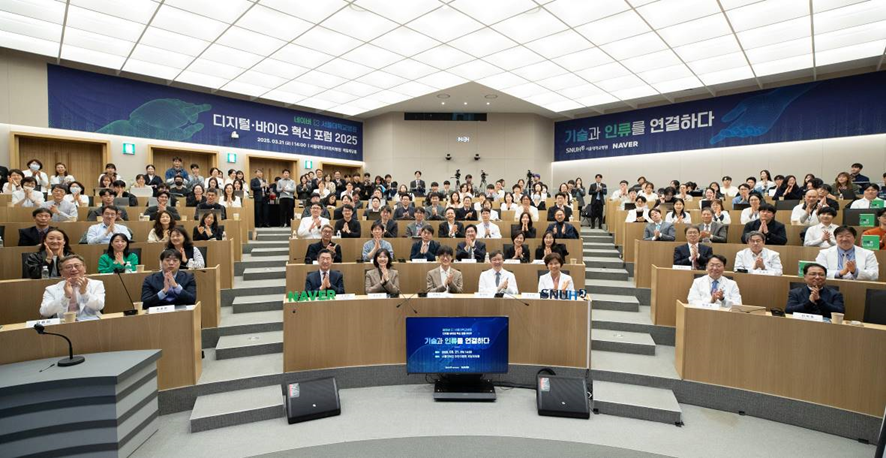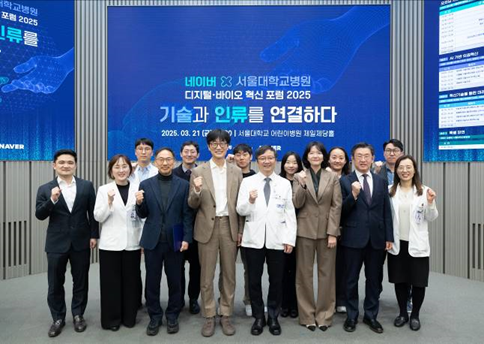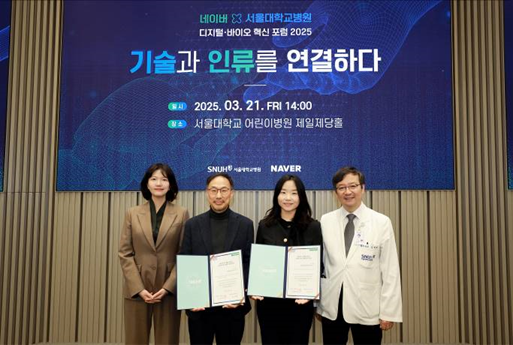SNUH Hosts “Digital & Bio Innovation Forum 2025”
— Sharing outcomes of Naver’s 30-billion KRW research funding initiative over three years
— Discussing the integration of advanced digital bio technologies into clinical practice

[Photo] Digital & Bio Innovation Forum 2025
Seoul National University Hospital (SNUH) co-hosted the “Digital & Bio Innovation Forum 2025” with Naver on March 21, aiming to explore the convergence of cutting-edge technology and clinical medicine. The forum served as a platform to showcase SNUH’s robust research capabilities and to lay the foundation for patient-centered future healthcare.
With the theme "Connecting Technology and Humanity," the forum featured key figures including SNUH President Young-Tae Kim, Biomedical Research Institute Director Yong-Jin Kim, Naver CEO Soo-yeon Choi, and Naver GIO Hae-jin Lee. Together, they discussed the outcomes of digital bio research, commercialization cases, and potential clinical applications.
In July 2023, SNUH launched the “NAVER Digital Bio Challenge Research Support Program”, a three-year initiative supported by a donation from Naver totaling KRW 30 billion. The program aims to foster original and innovative medical research by researchers affiliated with SNUH and Seoul National University College of Medicine. Its goals include creating an environment conducive to research immersion, systematic management of outcomes, and establishing a sustainable ecosystem connecting research, clinical application, and commercialization.
The program supports innovative and original research, research aimed at intellectual property and commercialization, as well as multidisciplinary studies. In the first year (July 2023–June 2024), 24 projects were selected out of 436 submissions. In the second year (July 2024–June 2025), 20 were selected from 197 proposals. The third year (July 2025–June 2026) will continue to identify promising innovations in next-generation medicine.
The Digital & Bio Innovation Forum 2025, designed to share these outcomes, featured two sessions and a special lecture by Naver GIO Hae-Jin Lee, focusing on the transformation of future healthcare through innovation.
The first session, titled “AI-Based Medical Innovation,” was co-moderated by Naver D2SF Leader Sang-Hwan Yang and SNUH Biomedical Research Institute Director Yong-Jin Kim. Professor Soon-Ho Yoon (Department of Radiology, SNUH) discussed the development of high-reliability AI models through standardized medical databases and multi-center data integration. Professor Hyung-Chul Lee (SNUH Healthcare AI Research Institute) presented the development of a large language model (LLM) tailored to Korea’s medical environment and its clinical potential. Professor Chang-Han Lee (Department of Pharmacology, SNU College of Medicine) introduced an AI-powered ultra-fast precision antibody discovery platform that revolutionizes antibody screening. Medical student Yoo-Bin Bae (SNU College of Medicine) proposed secure methods for utilizing medical data, including homomorphic encryption technologies. A Q&A session followed, involving in-depth discussions on ethical and security concerns surrounding the future of medical AI.
The second session, themed “Pioneering Future Medicine with Innovative Technologies,” was moderated by Naver Healthcare Research Director Gun-Ho Na and SNU College of Medicine Vice Dean for Research Ho-Young Lee. Professor Seung-Pyo Lee (Division of Cardiology, SNUH) presented a novel wireless intracardiac transmitter-receiver device that can be injected and recharged repeatedly, offering new possibilities for heart failure treatment. Professor Jae-Hwan Kim (Department of Gastroenterology, Seoul National University Bundang Hospital) shared plans for a painless, flexible, and expandable robotic endoscope, addressing limitations of current endoscopic technologies. Professor Jun-Young Seo (Department of Radiology, SNUH) introduced an automated AI-integrated robotic system aimed at enhancing the quality of transrectal prostate ultrasound exams and improving examination conditions. Professor Dong-Hyun Cho (Department of Anatomy, SNU College of Medicine) presented the development and preclinical verification of an oligonucleotide (ASO)-based therapy for customized gene treatment in children with Usher syndrome. Following the presentations, participants engaged in active discussions on commercialization potential and clinical advantages of each technology.
Naver CEO Soo-Yeon Choi stated, “Naver has driven innovation across various industries using digital technologies such as AI, big data, and cloud, and we believe these technologies can bring new transformations to the healthcare sector. We look forward to the collaborative research with SNUH leading to more groundbreaking technological developments and advancements in medicine.”
SNUH President Young-Tae Kim remarked, “As a research-driven hospital, SNUH is committed to fostering a creative research environment and promoting high-level and multidisciplinary research. We aim to accelerate digital bio innovation through our synergy with Naver and to strengthen the research-clinical-commercialization cycle by nurturing outstanding physician-scientists, ultimately leading the direction of future advanced healthcare.”

[Photo] Naver GIO Lee Hae-jin (fourth from the left in the front row), SNUH President Kim Young-tae (fifth from the left in the front row), Naver CEO Choi Soo-yeon (sixth from the left in the front row).

[Photo] Award ceremony of the 2024 Selected Project Certificate.